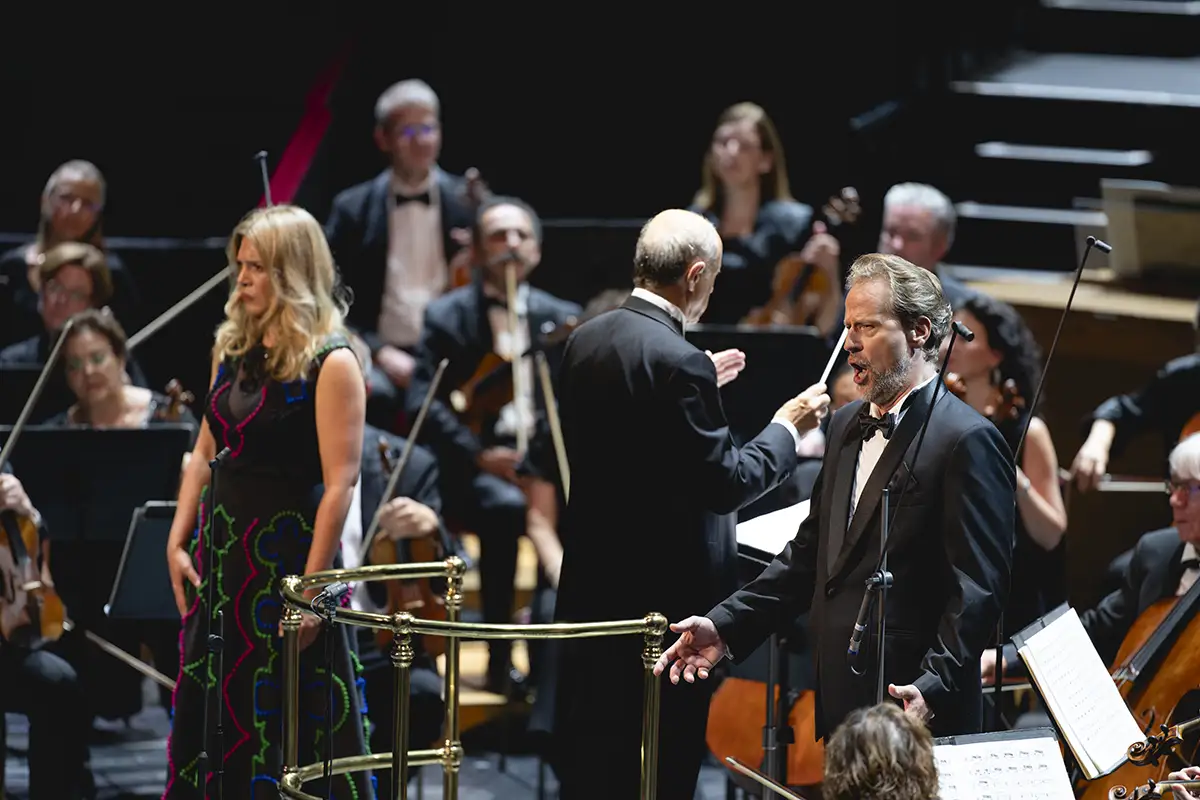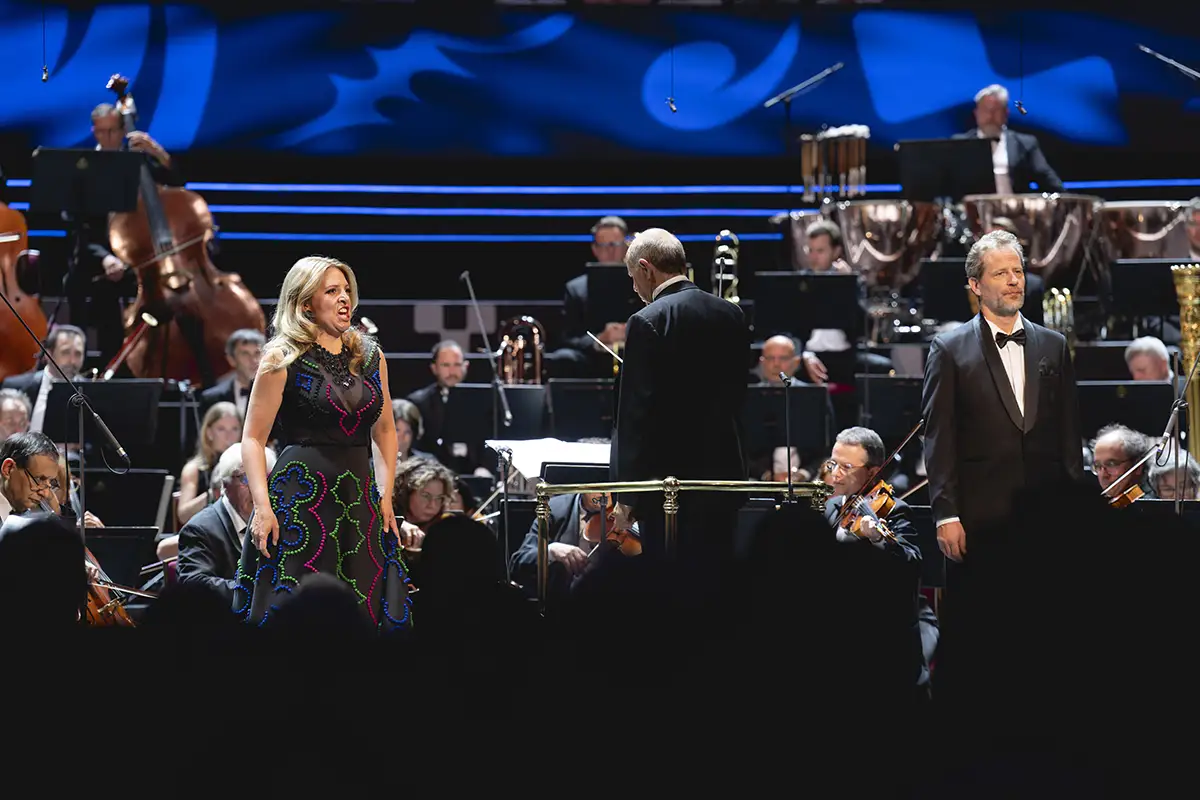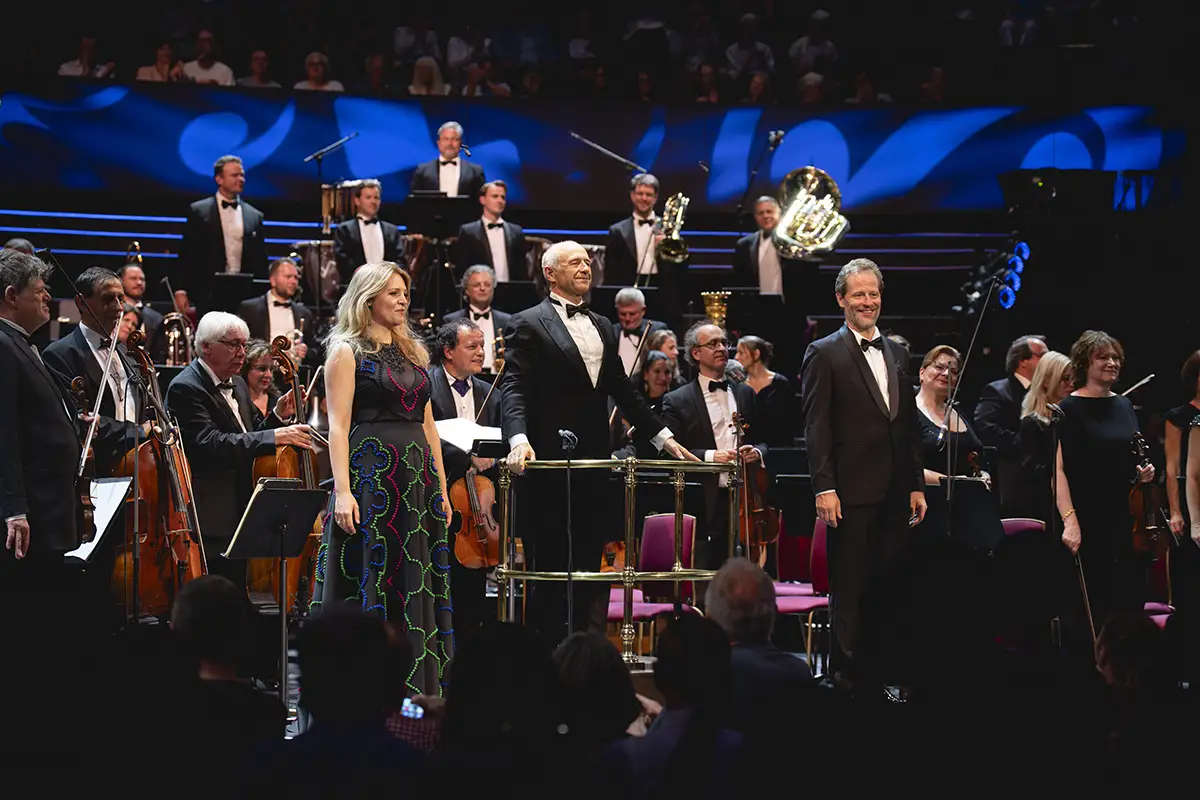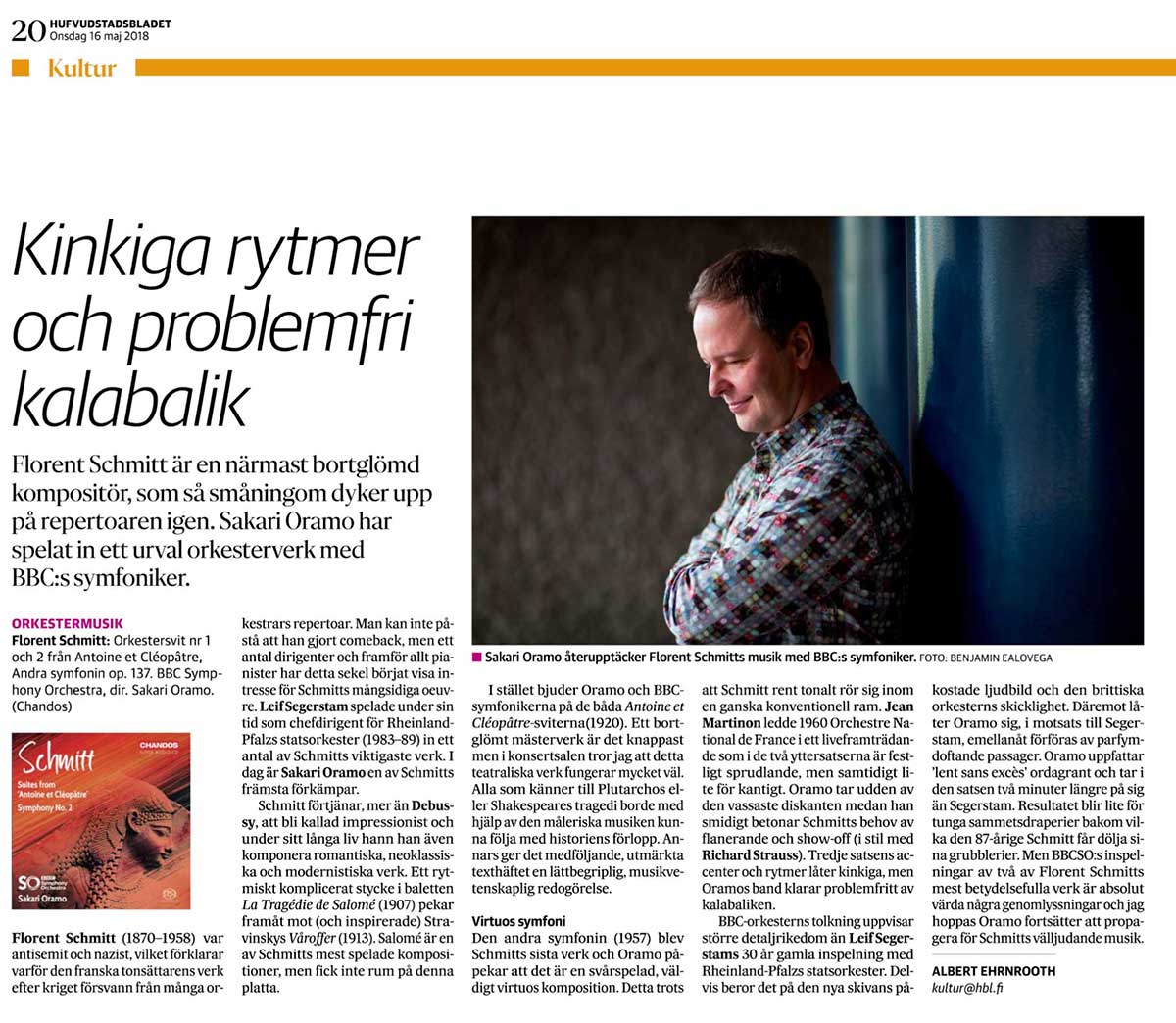Is Duke Bluebeard’s Castle a tale of external or internal events?
¨Where is the stage: within, or outside you ?¨ asks the Bard in the prologue to Bluebeard’s Castle. Iván Fischer, the founder and conductor of the Budapest Festival Orchestra (BFO), recites the words of the Prologue in Hungarian, standing on his rostrum in the Royal Albert Hall, flanked by two singers on lower podiums. Mezzo-soprano Dorottya Láng (Judith) and bass Krisztián Cser (Bluebeard) will remain separated throughout this concert performance of Béla Bartók’s one-act, one-hour opera.
With no set or lightning effects, the separation of the soloists is a powerful visual metaphor: man and woman, forever divided, doomed to never really understand each other without causing harm. This is the essence of Béla Balázs’ libretto – and arguably also the story of Bartok’s own romantic life. He dedicated the opera to his first wife Márta Ziegler, a year after the birth of their son. Bartók was a very private and introspective man, not drawn to socialising other than with close friends. That is probably why the libretto of Bluebeard appealed to him and inspired him to compose his only opera.
Bluebeard’s Castle (1911, rev.1917) shares clear affinities with Debussy’s Pelléas et Mélisande (1902). Both works employ modal scales, subtle timbral changes and dissonance to evoke mood. Each opens in a subdued, almost tentative manner. Steeped in French symbolism both psychodramas put great emphasis on the intimate nature of the words, the rhythm of the language, and the speech-like vocal lines.
In the programme the conductor Iván Fischer points out that Bluebeard’s Castle can only be performed convincingly by musicians attuned to the Hungarian language – its rhythmic and declamatory inflections, and subtle inflections. Maybe there’s a hint of nationalism hiding in that claim, but tonight’s soloists and most of the orchestra members are Hungarians. From the first note, it’s evident they know the score intimately. It’s hard to imagine a more masterful realisation of this masterpiece. This BBC Proms performance proves once and for all that you don’t need an elaborate set to make Bluebeard’s Castle work perfectly. The world that is depicted here in words and music concerns the dark recesses of our mind – something we are all familiar with.
Judith (Dorottya Láng) leaves behind her parents, brother and the man she was going to marry. As one door closes , she follows her new husband, the enigmatic Duke Bluebeard, to his windowless castle. The castle walls are weeping , but Judith vows to dry them with her lips. As soon as she enters the hall of the castle she is struck by the darkness. She wants to let the sun in and wonders why the seven large doors are locked. She insists that they must be opened, to let in light and fresh (positive) air.
A sigh is heard from the orchestra. It’s the castle that moans and Bluebeard hands Judith the key to the first door. Aggressive violin tremolos accompany her into the torture chamber where she finds that the walls are bleeding. But at least the light gets brighter. All the doors must be opened, she decides.
The second door reveals an armoury. Judith can see dried blood on the weapons, confirming whispered rumours of Bluebeard’s dark past. ¨Watch out for us, Judith¨, Bluebeard sings.
The third door opens to glittering jewels and diamonds and all the riches for her to enjoy. The celesta shimmers and glimmers, a solo violin plays a ditty while the trumpets sustain a warm glow. But there’s blood on the crown, according to Judith. Bluebeard urges her to open the fourth door. The fourth door reveals birdsong (flutes), the sound of a bell-like celesta, harps, and a fragrant garden watered by blood, according to Judith.

Bluebeard implores her not to ask questions and to open door no.5. The music surges to a triumphant C major and we are firmly on Wagnerian and Richard Straussian territory. The BFO produces a frightening, magnificent sound – originally an organ joined in, but in the 1917 version it was scrapped. The door has opened up to stunning views of Bluebeard’s kingdom. Judith only manages to utter a dumbfounded: Ah! She’s overwhelmed by the riches, but she claims that the clouds are casting a bloody shadow. Bluebeard points out that the castle is bathed in sunlight. She insists the final two doors must be opened.
The orchestra lets out a mournful sound. Yes, this is an orchestra that’s also known for its vocal capabilities – in a previous Proms concert they actually sang an encore.
The sixth door reveals a lake of tears, there is more harp plucking and a sorrowful clarinet. The light starts to fade.
During this Proms performance the two soloists remain in their spot next to the conductor, but progressively Dorottya Láng becomes more animated, whereas Krisztián Cser, tall and regal, stays fairly motionless.
The Duke wants to embrace his wife ¨Kiss me, kiss me, ask no question¨, but she ignores his warnings. The music builds towards a climax that could become ugly, violent. She’s now convinced that his former wives – all murdered – are behind the final door.
Bluebeard tries to tells her the truth, but she doesn’t believe him. She’s stunned to find his former wives alive, and hauntingly beautiful. He reveals that they represent Dawn, Noon and Evening. Judith, awed, admits that they are more beautiful than her.
Bluebeard crowns her as Midnight. Despite faint protests, she accepts her fate – realising too late that she misjudged him. She joins the other wives and closes the seventh door behind her, leaving Bluebeard alone in darkness.
The darker the timbre of the bass, the ‘badder’ the character, I like to think. Krisztián Cser’s bass is light brown and therefore ideal to convince us that Bluebeard in his heart is a good person.

Dorottya Láng is a determined, even fearless Judith who only begins to shows some doubt when she discovers Bluebeard’s glorious Kingdom behind the fifth door. If only she would have stopped her quest there, their marriage could have been saved. Láng never resorts to hysterics or big gestures, and inhabits the role as if she’s lived it.
This is in Iván Fischer and his orchestra’s blood. It feels like they can change the timbre on impulse, depending on what the singers do, or the mood of the listeners. The performance comes alive during the performance because ¨every player knows the words and what they express¨, as Fisher puts it in the programme notes.
This stripped down version (devoid of a set), that purely relies on the music and the words, reinforces the poetry of the piece, aided by the native Hungarian speakers.
The psychology behind this classic tale has been interpreted in countless different ways. Bartok’s Bluebeard is clearly in a dark mental place, and yet he cherishes the memory of his former wives – women that he couldn’t live with, but didn’t kill (despite what some versions of the story suggest). Judith, by contrast, is overly inquisitive too early in their relationship, and quick to believe rumours rather than getting to know her husband. While it’s tempting to analyze this psychodrama, it’s the unresolved mysteries and secrets that make this opera open to interpretation and so fascinating.
If you live in the UK, you can find the broadcast of the concert here
The concert opened with Beethoven’s Seventh Symphony – an optimistic contrast to Bartók’s darker masterpiecee. By Beethoven’s standards, No.7 sounds remarkably positive, and Iván Fischer, conducting without a score, was wearing a big smile throughout this¨apotheosis of the dance¨ (Wagner’s words). Berlioz compared the 1st movement to a peasant dance, but the BFO made its repeated three dotted figures tripping the light fantastic. No peasants here.Though it is said that the Allegretto is reminiscent of the Eroica’s Funeral March, Fischer wasn’t in a funereal mood. Instead he stressed the stateliness by slightly upping the tempo – allegretto means ‘fairly brisk’ – just enough to keep the pulse of the patient alive. The giddy mood of the Presto was always destined to be outdone by the Allegro con brio finale. High spirits reigned: stamping timpani, whirling strings, wild woodwinds and (almost) braying horns. Flautist Gabriella Pivon was clearly having a ball—at times, it felt like she was in the driver’s seat.
Beethoven, as they’ve proven a few times previously at the BBC Proms, is a cinch and an absolute joy to perform for Iván Fischer and his superb Budapest Symphony Orchestra.
Wednesday 6 August 2025 at the Royal Albert Hall
Albert Ehrnrooth



